
Blog Post
Artificial Intelligence
Healthcare Industry in the Era of Generative AI
Published on Aug 28, 2024
by Laura Salazar
Generative AI is playing a pivotal role in transforming the healthcare industry by streamlining operations and improving patient care.
One of the key areas where artificial intelligence (AI) is making a difference in analyzing real time medical data. AI can process and interpret vast data, identifying patterns and trends that humans might miss, which is especially valuable in clinical trials.
Moreover, generative artificial intelligence is also contributing to the development of personalized medicine. By analyzing a patient's genetic data, AI can help create treatment plans tailored to the patients' unique genetic makeup.
In summary, AI is a game changer in the healthcare industry by improving diagnosis, prognosis, and treatment planning.
How is AI Being Used in Healthcare?
Beyond simply analyzing data and diagnosing. The technology also powers advancements in drug development and personalized medicine.
One of the most promising applications of generative AI is in the field of drug discovery.
AI algorithms, including those utilizing natural language processing, can analyze vast amounts of data to identify potential drug candidates. This capability can significantly speed up the drug discovery process.
Drug Discovery and Personalized Medicine
By speeding up the process and reducing costs, AI offers significant benefits. The role of generative AI in drug discovery includes analyzing vast amounts of data to identify potential drug candidates.
Additionally, this technology develops personalized treatment plans by analyzing a patient's genetic data to suggest treatments tailored to their unique genetic makeup.
Medical Data Analysis and Patient Care
It can process and interpret vast amounts of data, identifying patterns and trends that humans might miss. This capability is particularly useful in patient care. AI can analyze patient data to predict disease progression and suggest the most effective treatment options.
Diagnostic Procedures and Prognosis
It can analyze patient data to predict disease progression and suggest the most effective treatment options. This technology is particularly useful in complex cases where human doctors might struggle to make accurate diagnoses. AI can analyze vast amounts of data to identify patterns and trends that humans might miss.
Operational Efficiency and Healthcare Staffing
One area where AI is making a significant impact is in healthcare staffing. Additionally, AI helps healthcare facilities optimize staffing by analyzing patient volumes, staff availability, and other factors.
AI chatbots improve the process by handling routine inquiries and scheduling, which boosts patient care, reduces wait times, and makes resource use more efficient. Here are some ways AI is improving healthcare staffing:
Predicting patient volumes to optimize staff scheduling.
Identifying patterns in staff performance to improve training and development.
Analyzing patient feedback to improve staff-patient interactions.
Software Integration with Generative AI in Healthcare
Generative AI tool is not just a standalone technology. Healthcare providers are integrating it with existing software systems and machine learning models to enhance their capabilities.
For instance, AI enhances Electronic Health Records (EHR) systems to provide predictive insights. This can help doctors make more informed decisions about patient care.
Similarly, Generative AI models integrate medical billing software to automate the billing process, reducing errors and improving efficiency.
These advancements illustrate how modern generative AI systems are improving user interaction by streamlining and optimizing various healthcare processes.
Here are some ways AI is being integrated with healthcare software:
Enhancing EHR systems with predictive analytics.
Automating the medical billing process.
Improving telemedicine software with AI-powered diagnostics.
Types of Software Used in Healthcare Industry
EHR systems to store and manage patient data. As a crucial part of modern healthcare, AI enhances their effectiveness.
Medical billing software manages financial aspects, and AI helps automate this process and reduce errors.
Telemedicine software offers remote services, and AI enhances these platforms with capabilities like AI-powered diagnostics.
Ethical Considerations and Future Outlook
The integration of generative AI in healthcare, including large language models (LLMs) and foundational models, is not without its challenges. One of the main concerns is data privacy and security, as patient data is highly sensitive.
Designing AI systems to protect data and comply with privacy laws is crucial. Additionally, the ethical use of AI remains a concern; clear guidelines are needed to ensure that these technologies are used responsibly and ethically in healthcare.
The Future of Generative AI in Healthcare
Despite these challenges, the future of generative AI in healthcare looks promising. It has the potential to revolutionize many aspects of healthcare, from diagnosis to treatment.
AI could also play a key role in managing healthcare staffing and improving operational efficiency. This could help healthcare facilities provide better care while reducing costs.
